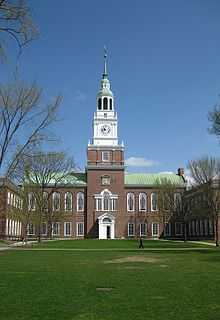Kappa Kappa Kappa
| Kappa Kappa Kappa Society | |
|---|---|
| ΚΚΚ | |
 | |
| Founded |
July 13, 1842 Dartmouth College |
| Type | Social |
| Motto | Tui Filii Dartmuthensi Tuoque Honori Fidelis |
| Colors | Dartmouth Green |
| Chapters | 1 |
| Headquarters |
1 Webster Avenue Hanover, New Hampshire, USA |
| Homepage | http://www.tri-kap.com/ |

Kappa Kappa Kappa (Tri-Kap) is a local men's fraternity at Dartmouth College in Hanover, New Hampshire. The fraternity was founded in 1842 and is the second-oldest fraternity at Dartmouth College. Tri-Kap is the oldest local fraternity in the United States.[citation needed] It is located at 1 Webster Avenue, Hanover, New Hampshire.
Despite offers to establish additional branches at other institutions, the brotherhood of Tri-Kap has remained a single-school institution for the duration of its history and is not a chapter of any national organization. Today it is one of the many recognized Dartmouth College Greek organizations.
The organization has no affiliation with the post-American Civil War Ku Klux Klan, which formed in 1866, twenty-four years after the founding of Kappa Kappa Kappa, and adopted the Roman-alphabet initials, “KKK”, similar to the Greek letters of Tri-Kap - ΚΚΚ.
History
Early years
Dartmouth College was founded by Eleazar Wheelock in 1769 for "the education of the Indian youth, English youth...and any others." Fourteen years later the first student society came into existence, and student societies and the College have been intertwined ever since.
For much of the late 18th and early 19th centuries, two societies vied for preeminence: the "Socials" (officially the Society of Social Friends, est. 1783) and the "Fraters" (the United Fraternity, est. 1786). By 1815, half of the College were members, and a fierce competition existed between the two in order to attract the finest students.
In 1842, a dispute arose within the Fraters regarding a vote on the organization's leadership. The fracture resulted in the formation of Psi Upsilon, by those who supported John Tyler in the contest, and Kappa Kappa Kappa, by those who supported Harrison Hobart.
The society
Tri-Kap was founded on July 13, 1842, by Harrison Carroll Hobart and two of his closest companions, Stephen Gordon Nash, and John Dudley Philbrick, all Class of 1842. The society was based on the principles of democracy, loyalty to Dartmouth, and equality of opportunity. Originally a literary and debate society, Tri-Kap officially became a social society in 1905 and has remained so ever since.
Physical plants
Tri-Kap was the first student society at Dartmouth with its own meeting place, a building called The Hall, which was originally located where the Hopkins Center for the Arts stands today. Opened on July 28, 1860, the Hall served as Tri-Kap's home until the Society moved into the Parker House in 1894. Parker House was located where the modern-day Silsby Hall stands. In 1923, the Society moved into 1 Webster Avenue, where it resides to this day.
Modern history
Tri-Kap became an official social society in 1905. Since this time Tri-Kap has remained popular on the Dartmouth campus as one of Dartmouth's largest and most popular fraternities with over 60 brothers hailing from across the United States and internationally.
Notable alumni
- Alex M. Azar (1988), Deputy Secretary of U.S. Department of Health and Human Services
- Peter Robinson (1979), White House Speechwriter for President Ronald Reagan
- Nick Lowery (1978), Player in the National Football League and Three-time Pro Bowl kicker.
- David Shribman (1976), Pulitzer Prize winner
- John F. Lundgren (1973), Director, President and Chief Executive Officer of Stanley Black & Decker, a Fortune 500 Company
- Mark Dillen Stitham (1972), Actor [Jake & the Fatman, Raven, Unsolved Mysteries, Lost]
- Douglas Walgren (1963), U.S. Congressman from Pennsylvania
- David Rosenbaum (1963), New York Times Journalist
- Nitya Pibulsonggram (1962), Foreign Minister of Thailand and former Thai Ambassador to the United States
- Dr. Bob (1902), Co-Founder of Alcoholics Anonymous
- Channing H. Cox (1901), Governor of Massachusetts
- Sherman Everett Burroughs (1894), U.S. Congressman from New Hampshire
- John Barrett (1889), U.S. Minister to Siam, the Argentine Republic, Panama, and Colombia
- Winfield Scott Hammond (1884), Governor of Minnesota
- Samuel D. Felker (1882), Governor of New Hampshire
- Samuel Walker McCall (1874), Governor of Massachusetts
- Irving Webster Drew (1870), U.S. Senator from New Hampshire
- Henry Eben Burnham (1865), U.S. Senator from New Hampshire
- Henry Moore Baker (1864), U.S. Congressman from New Hampshire
- Col. Frank Haskell (1854), Author of famous first-hand account of the Battle of Gettysburg
- Charles Henry Bell (1844), U.S. Senator and Governor of New Hampshire
- Ambrose A. Ranney (1844), U.S. Congressman from Massachusetts
- Benjamin Franklin Flanders (1842 - Honorary), Governor of Louisiana
- Daniel Clark (1834 - Honorary), U.S. Senator from New Hampshire
- Rufus Choate (1819 - Honorary), U.S. Senator from Massachusetts
- Levi Woodbury (1809 - Honorary), Governor of New Hampshire, U.S. Senator, Secretary of the Treasury, and U.S. Supreme Court Justice
- Daniel Webster (1801 - Honorary), U.S. Senator from Massachusetts, Congressman, and Secretary of State
- Lewis Cass (Honorary), Governor of Michigan, U.S. Senator, and Presidential nominee
External links
Society websites
General information
- Dartmouth College Inter-Fraternity Council
- Halls, Tombs and Houses: Student Society Architecture at Dartmouth
- Greek Houses at Dartmouth (incomplete)
| |||||||||||||||||||||||||
